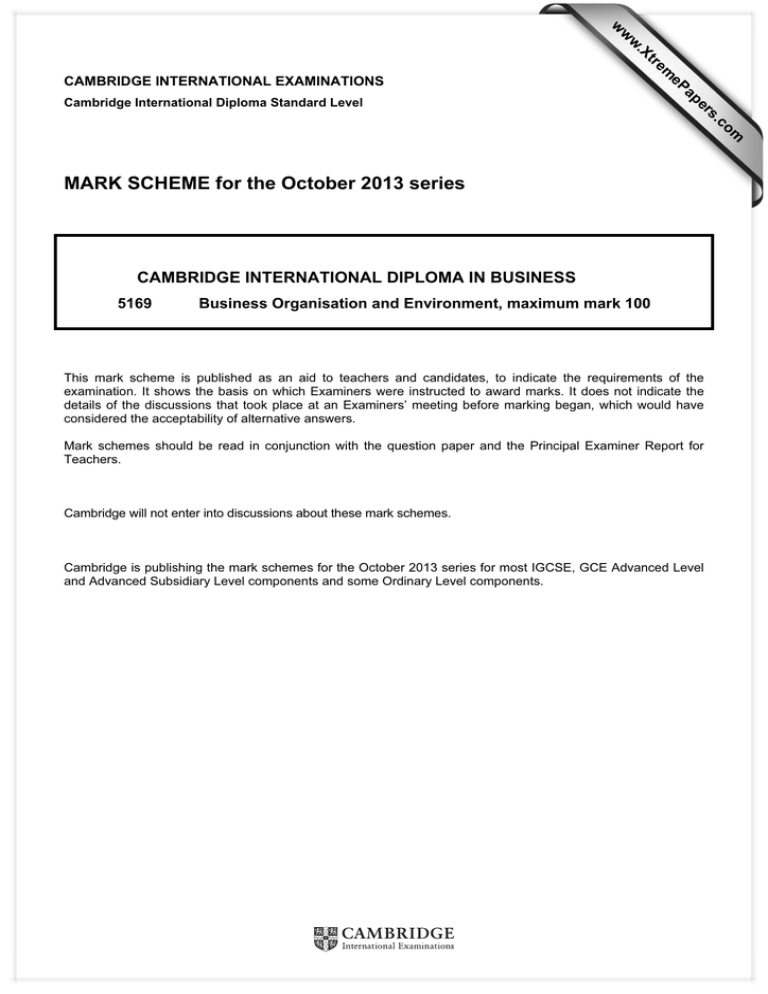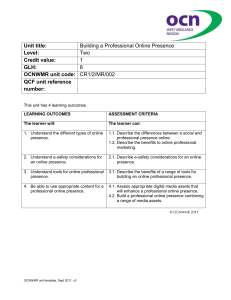MARK SCHEME for the October 2013 series www.XtremePapers.com
advertisement

w w ap eP om .c s er Cambridge International Diploma Standard Level m e tr .X w CAMBRIDGE INTERNATIONAL EXAMINATIONS MARK SCHEME for the October 2013 series CAMBRIDGE INTERNATIONAL DIPLOMA IN BUSINESS 5169 Business Organisation and Environment, maximum mark 100 This mark scheme is published as an aid to teachers and candidates, to indicate the requirements of the examination. It shows the basis on which Examiners were instructed to award marks. It does not indicate the details of the discussions that took place at an Examiners’ meeting before marking began, which would have considered the acceptability of alternative answers. Mark schemes should be read in conjunction with the question paper and the Principal Examiner Report for Teachers. Cambridge will not enter into discussions about these mark schemes. Cambridge is publishing the mark schemes for the October 2013 series for most IGCSE, GCE Advanced Level and Advanced Subsidiary Level components and some Ordinary Level components. Page 2 Mark Scheme Cambridge International Diploma – October 2013 Syllabus 5169 Examiners should note that: • • • • • • • • The following are not model answers but should be regarded as persuasive. The mark scheme identifies the more likely points that candidates will raise. A candidate may offer other relevant and suitable responses. Although some tasks can relate to any business, responses should be made in context where appropriate. The key is to test a candidate’s knowledge and awareness. Extensive answers are not called for but candidates should offer well-written informative responses. English is not the first language of the majority of our candidates. The quality of written language is not part of the assessment. This is a standard level paper. Usually, each response is followed by advice on the interpretation and application of marks. Since each task is worth 2, 4 or 6 marks, it seems unnecessary to append virtually the same advice to each task. Tables are therefore given which will apply to 4 mark questions, 2 × 2 questions, 6 mark questions and 2 × 3 questions. These notes are the guide for the entire examination paper. Four Mark Questions Marks Descriptors 1 A response indicating some basic or limited knowledge; identity of perhaps one element without discussion, explanation or application. 2 A response which identifies two elements without explanation or discussion, or identifies only one element but offers some discussion or explanation of that element. 3 A better answer that offers a very full discussion of one element or identifies two elements with some discussion or explanation on each. 4 The best possible response given the examination pressure; clear and direct answer to the task in context; reflects knowledge application and perhaps some judgement. Each Part of a 2 × 2 Question Marks Descriptors 1 A basic description or reason. 2 A good description or reason that has been expanded and possibly offers some explanation and is usually in context. © Cambridge International Examinations 2013 Page 3 Mark Scheme Cambridge International Diploma – October 2013 Syllabus 5169 Six Mark Questions Marks Descriptors 1 A response indicating some basic or limited knowledge, identity of perhaps one element without discussion, explanation or application. 2 A response that offers some explanation of one element or identifies two elements without discussion, explanation or application. 3 A better answer that offers two or more elements with some limited discussion and maybe some context. 4 This answer will offer good discussion on two or more elements usually in context. 5 A good discussion on all elements requested showing excellent knowledge with some reasoning and maybe limited judgement 6 The best possible response given the examination pressure; clear and direct answer to the task. The response is well structured and reflects knowledge, application, reasoning and some judgement, and importantly, context. Each Part of a 2 × 3 Question Marks Descriptors 1 A basic description, reason or explanation. 2 A better answer that offers some discussion, usually in context. 3 The best possible response given the examination pressure. Well-structured offering good knowledge, possibly judgement and almost always in context. © Cambridge International Examinations 2013 Page 4 Mark Scheme Cambridge International Diploma – October 2013 Syllabus 5169 Candidates are expected to use material in the case study to support their responses i.e. respond in context wherever appropriate. This is standard level so the responses are not expected to be as complete as the mark scheme suggests below. The points identified are the more likely ones that candidates will raise. We are looking for balanced responses which look for knowledge, understanding and application. 1 (a) GLH operates in the tertiary sector. State the sector in which each of the following suppliers to GLH operate. (i) Mombasa Farms Ltd which supplies them with fresh food grown on their own farms. [2] Primary (ii) Blue Pools Ltd which services the swimming pool every week. [2] Tertiary (b) Profitability and good service are two objectives of GLH. Describe two further objectives that George might set for the next 12 months. [2 × 2 = 4] • • • • Increase room occupancy Build more rooms Attract more foreign tourists Attract more Kenyan tourists (c) At times, GLH suffers from a shortage of working capital. Define working capital and suggest actions that George could take to improve his working capital position. [6] • • • • Working capital is current assets minus current liabilities Can also be defined as the funds available to meet immediate business expenditure George could arrange an overdraft at the bank He could raise cash by selling assets or selling and leasing back assets (d) George is thinking of changing from a sole trader to a limited company. He would own 50% of the shares and his daughters would own 25% each. Explain the advantages and disadvantages of this change. [6] • • Advantages – limited liability − better ability to borrow from bank − business continues on death of a shareholder Disadvantages – more formalities needed for limited company − George may think he is losing some control © Cambridge International Examinations 2013 Page 5 2 Mark Scheme Cambridge International Diploma – October 2013 Syllabus 5169 (a) Describe the advantages of GLH having a wide span of control throughout most of the organisation. [4] • • • less supervision means lower costs more decision making by subordinates improved job satisfaction for subordinates (b) Reservations for the hotel are handled by the front office. Explain why it is important that the front office communicate clearly with housekeeping. [4] • • • • housekeeping need to know how many rooms are being used they also need to know which rooms are being vacated on a particular day if all rooms are being used, housekeeping may need to employ extra staff if there are any special requests such as an extra children’s bed, then housekeeping must be told (c) The housekeeping department does not produce revenue. Discuss how target setting could help the department become more efficient. [6] • • • each employee could be given a target number of rooms to clean. This could improve efficiency and may increase employee motivation spot checks on the cleanliness of cleaned rooms could be made to control service standards rewards could be given based on the number of rooms cleaned and the standard of cleanliness (d) Explain three probable effects on staff of George being an autocratic manager. [3 × 2 = 6] • • • • • • 3 staff become dependent on him staff may not want to make decisions staff, especially managers, may become dissatisfied with George poor levels of motivation among employees decisions are made and carried out quickly only one opinion (George’s) matters (a) Describe the advantages to GLH of employing some casual staff. • • • can keep costs down by only employing some staff when they are needed easier to dismiss casual staff whose work is not satisfactory when recruiting permanent staff, may know of good workers among casual staff © Cambridge International Examinations 2013 [4] Page 6 Mark Scheme Cambridge International Diploma – October 2013 Syllabus 5169 (b) Explain one advantage and one disadvantage of job sharing for waiters and waitresses in the restaurant. [2 × 2 = 4] • • • • one advantage is that each worker can work part-time which may suit their other personal responsibilities they can cover each other when necessary a disadvantage is the time taken to changeover another disadvantage is that the two or more people job sharing have to agree on the times they will work to cover the requirements of GLH (c) George expects his staff to be punctual. Describe three other expectations George might have of his staff. [3 × 2 = 6] • • • staff should show commitment by always working to the best of their ability staff should be loyal to GLH and not criticise the business to external stakeholders staff should follow instructions carefully although discussion on better ways of working should always be encouraged (d) Explain why the possibility of promotion may be important to the staff. • • • 4 this is a motivational factor staff are usually ambitious and want to increase their income and take more responsibility internal promotion will motivate all staff and encourage them in order for them to be promoted in the future (a) Explain the advantages to George of spending money on training for his staff. • • • [6] [4] training usually increases the motivation of the staff training should improve the level of service to his customers training should improve the efficiency of the business (b) The location on the beach is an important advantage to GLH. Describe what disadvantages they might have in being in an area away from any towns or cities. [4] • • • there may not be many locally available staff local transport may be poor infrastructure, such as sewers, mains water and roads, may be poor (c) Explain why the government would want to encourage tourism and support George’s business. [6] • • • many tourists are from overseas and bring foreign currency earnings into the country which is vital for the balance of payments of Kenya the tourist industry supplies employment for the Kenyans some of the profits from businesses such as GLH will be paid in taxes to the Kenyan government © Cambridge International Examinations 2013 Page 7 Mark Scheme Cambridge International Diploma – October 2013 (d) Explain what effect a world recession could have on GLH. • • • 5 • • • [6] the slowdown would have meant people had less disposable income and therefore less to spend on holidays which would reduce the demand for GLH the general tightening of credit would have made it harder for GLH to obtain loans if they could obtain loans the interest rate should have been lower (a) Describe how GLH could promote itself in international markets. • Syllabus 5169 [4] practical methods are required so television would not be practical in international markets brochures to travel agents advertisements in magazines letters to previous customers (b) Describe how GLH could segment its market in order to increase sales opportunities. [4] • one segment could be Kenyan or international customers • segmenting by age could be useful • marital status • international customers could be further broken down by country • social class (c) Explain the importance of price in the marketing mix of GLH. • • • • [6] price is determined by the demand for the product GLH could calculate their costs and price by a mark up it is far more likely that they will use a market orientated price which would be determined by what the customer will pay and what the competition are charging setting the correct price will determine the financial success of GLH because too high a price will mean too few customers, and too low a price will be in danger of not covering costs (d) Explain why the link with the safari lodge might give GLH a competitive advantage. [6] • • • • this link makes it easier for customers to book a safari/beach holiday the safari lodge and the hotel complement each other and, as long as both offer similar standards, each should increase their sales cross selling could occur if customers originally only book at one of the establishments competitors of GLH who only offer a beach holiday should be at a disadvantage. © Cambridge International Examinations 2013


